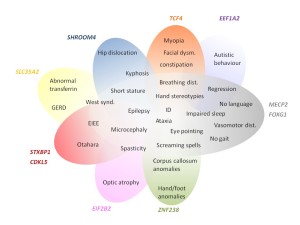Rett syndrome (RTT) is a severe neurodevelopmental disorder. We investigated a group of 19 MECP2 and CDKL5 negative RTT-like patients. Pathogenic genomic imbalances were found in two patients: a 18q21.2 deletion encompassing TCF4 and a mosaic uniparental disomy of chromosome 3. Very likely pathogenic sequence variants were identified through exome sequencing in genes previously implicated in neurodevelopmental disorders (EEF1A2, STXBP1, ZNF238, SLC35A2, ZFX, SHROOM4 and EIF2B2) as well as in novel candidate genes (RHOBTB2, SMARCA1, GABBR2, EIF4G1 and HTT), potentially explaining disease in 68% of the cases. Bioinformatics analysis shows significant interaction between the novel and previously known RTT-causative genes. (By Fátima Lopes, http://jmg.bmj.com/content/early/2016/01/06/jmedgenet-2015-103568 )
Identification of novel genetic causes of Rett syndrome-like phenotypes
(Visited 1,434 times, 1 visits today)
